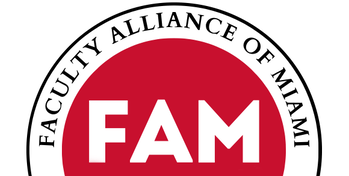“Save Ohio Higher Ed II: Overcoming Inequities” will take place Friday, June 19, 4pm (register here). The forum will feature the well-known scholar Christopher Newfield on how university budget priorities reinforce racial inequities and how our schools can and should steer clear of austerity cuts. Other guests—including student journalists assaulted by police in recent protests—will discuss the human and fiscal costs of policing on campus, which disproportionately affects Black and brown students, staff, and faculty.
Originally, SOHE organizers had planned the “Overcoming Inequities” forum as a discussion about alternatives to the ways that Ohio’s colleges and universities are handling the current fiscal emergency—a crisis caused not only by COVID-19, but by decades of declining state disinvestment, corporate-style management, and budgets that pull resources away from the academic mission.
During the planning, another ongoing crisis came to a head: racialized police brutality and a highly militarized police force.
The questions we must now ask include:
- How is what is happening in the streets relevant to the crisis we face in higher education?
- Can we think productively about how easily the state has devastatingly defunded higher education while at the same time closely guarding public funds for the police?
The police and higher ed are both public institutions, but the state has consistently favored the former over the latter. Public universities, lacking state support, have deemphasized their public mission in favor of a revenue-oriented model. Similarly, American policing has failed in its mission to protect the public. Universities and policing exemplify the contradictions between the people-serving goals of a public mission and antidemocratic practices that reproduce hierarchical social structures.
In 2015, for example, University of Cincinnati campus police officer Ray Tensing shot an unarmed Black citizen, Samuel Dubose, off campus. Tensing walked free—with a $344,000 settlement from UC. UC spends $10 million a year just on policing. $10 million exceeds the annual budgets of all but two academic departments at UC. Several police make six-figure salaries. The average UC police salary is above $80,000 a year.
Our speaker Genesis, a former UC graduate student who was involved in organizing protests about Tensing, will address the Tensing case. Other speakers include student journalists at Ohio State University who were assaulted by police during a recent protest.
#SaveOhioHigherEd is a coalition of higher ed workers across Ohio who have come together in this time of crisis in support of higher education for the public good. Miami AAUP helped establish and continues to support this coalition.
#SaveOhioHigherEd is a coalition of higher ed workers across Ohio who have come together in this time of crisis in support of higher education for the public good. Miami AAUP helped establish and continues to support this coalition.
We hope you can make it!


Leave a Reply